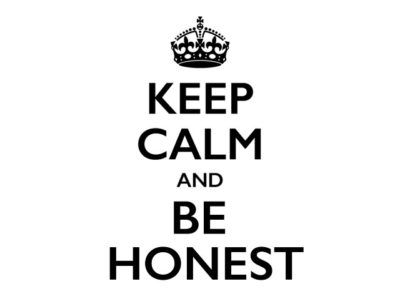
Is honesty the best policy?
When it comes to client procurement there are some questions I’d advise any agency not to gloss over.
Question 1: How important is a client to your business?
It’s almost inevitable that a successful and growing agency will at some point see a marked increase in the share of revenue that’s vested in one or two customers (at least momentarily) so it’s not always possible for a client to expect you to have a balanced customer profile — they can’t always have their cake and eat it. It’s very tempting when a large client’s procurement department asks to see the % of income they represent of your revenues to dumb down this number. Obviously they are keen to see what dependency you have on their business or for that matter any other clients.
Firstly, if you dumb down their numbers you’re “dumbing up” someone else’s – perhaps not a problem but may lead to an ever harder job to reconcile figures – and procurement like things to add up – think of them as auditors, if they can’t tally things they’ll keep digging.
Secondly, ensuring a client knows how important they are to your business can ensure they treat you properly — such as paying you on reasonable terms and paying you on time.
The best customers will value your relationship and they will not want to make a problem for your business so this ‘dependency’ can actually work for you — that’s your challenge.
Question 2: How much profit are you making?
Profit is not an ‘ugly’ word to use with clients – after all you’re gainfully employed by them to contribute to their profit or certainly to their value creation ambitions – which impact their net and / or gross profit.
Firstly, profits can be abnormally high on a project, and wholly defensible if significant levels of innovation, risk or uncertainty exist. However, sustainable profit for the business is a consequence of consistently getting a number of different things right – across multiple projects and engagements — including knowing your commercial model. So profit is the end product of running your business well – which procurement should know! There will also be times that you’ve made a conscious decision to reinvest profits — if this is explained a lack of profitability won’t be a red flag.
Secondly, a big part of pricing discussions requires some transparency on rate cards, which for most agencies — despite a desire for a more value based pricing approach — remains a cost plus margin model. There’s no point spending time justifying fees and then being elusive about making a profit – it could be that the figures they can access suggest you are making ‘a lot’ of money or ‘not very much’. Is this due to other clients (that they may be subsidising!) or is it a product of how you are managing the overall business? The client in question may even be “that unprofitable client” and procurement will more often than not be as concerned about this as you are, as they want good pricing but not at the expense of strong and healthy suppliers.
The truth is making a profit is important for the health of your business — and you’d be better off with fewer more profitable clients rather than a long list, with some unprofitable clients — so work with client procurement to achieve this goal on their business.
Question 3: What is your Net Asset position?
Many independent marketing agencies in the UK may be filing abbreviated accounts (based on at least 2 of the following holding true — turnover of £10.2 million or less, £5.1 million or less on its balance sheet, 50 employees or less) but even in this case your Balance Sheet is in the public domain.
Firstly, published accounts (including abbreviated and unaudited accounts) give someone a basic picture of your financial performance. Some businesses will be reinvesting profits and others may have high levels of dividends driven by shareholder needs or a pre-determined policy, all of which can result in a weak Balance Sheet — an indicator at a given point in time but not always representative of the underlying health of the business. Critically if these figures are not explained they simply wont tell a story — your story!
Secondly, procurement will often use external credit agency checks and these will give a ‘rating’ that is either below, on or above average risk. These checks are based on historical data, often many months old and won’t factor in future forecasts—with filed accounts lodged anything up to 9 months after a year end is completed this can be a very long time in the agency world — and certainly any external assessments won’t know why the figures are what they are. Every agency business will know the importance of weekly Cash Flow management and monthly Profit & Loss reporting, but few look properly at the Balance Sheet (beyond accounts receivables) which is an important for understanding the strength of the business — bank balance, creditors, tax liabilities, debtors, retained profits, etc….
Net Asset position communicates a different view of your agency financial status from other figures — not necessarily less — so it’s well worth ensuring you regularly review your balance sheet and that way you’ll also be on top of the information that is often a starting point for procurement.
My time as a CFO within the marketing services industry started at the very time procurement began to have an enlarged role in the way brands were working with marketing agencies. Initially it was about providing information and validation, then restricting mark-ups on pass through costs and extensive price negotiation, but over the years procurement has — as in other industries — become a more autonomous and strategic function. The end result of which is you need a positive approach to building a relationship with your client procurement team and planning for success in this regard is essential.
Honesty is the best policy, but preparation is the best strategy! If you’d like help or advice on procurement or related topics covered in this article we can assist through our growth consultancy services.


